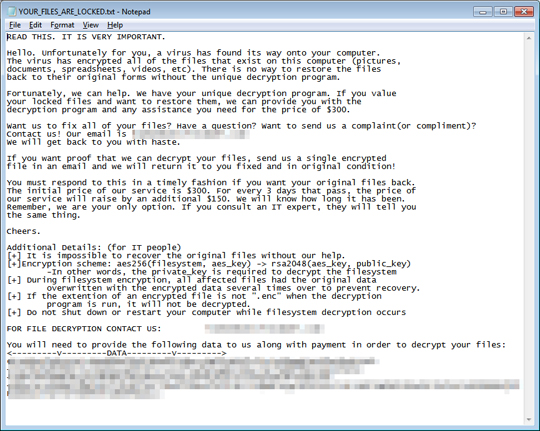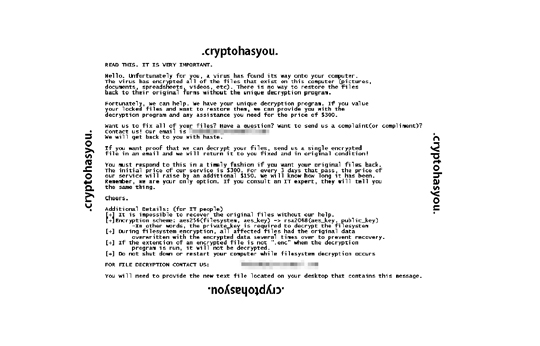RANSOM_CRYPTOHASU
Windows


Threat Type: Trojan
Destructiveness: No
Encrypted: Yes
In the wild: Yes
OVERVIEW
This Trojan arrives on a system as a file dropped by other malware or as a file downloaded unknowingly by users when visiting malicious sites.
TECHNICAL DETAILS
Arrival Details
This Trojan arrives on a system as a file dropped by other malware or as a file downloaded unknowingly by users when visiting malicious sites.
Installation
This Trojan drops the following files:
- %Application Data%\{random characters}.bmp - used as wallpaper
- %Desktop%, %User Profile%, %AllUsersProfile%, %User Temp%, %Application Data%, %AppDataLocal%, %Program Files%\YOUR_FILES_ARE_LOCKED.txt - ransom note
(Note: %Application Data% is the Application Data folder, where it usually is C:\Documents and Settings\{user name}\Application Data on Windows 2000, Windows Server 2003, and Windows XP (32- and 64-bit); C:\Users\{user name}\AppData\Roaming on Windows Vista (32- and 64-bit), Windows 7 (32- and 64-bit), Windows 8 (32- and 64-bit), Windows 8.1 (32- and 64-bit), Windows Server 2008, and Windows Server 2012.. %Program Files% is the Program Files folder, where it usually is C:\Program Files on all Windows operating system versions; C:\Program Files (x86) for 32-bit applications running on Windows 64-bit operating systems.)
Other System Modifications
This Trojan adds the following registry entries:
HKEY_CURRENT_USER\Software\Microsoft\
Windows\CurrentVersion\Run
{random characters} = "%Application Data%\YOUR_FILES_ARE_LOCKED.txt" To display the ransom note every startup
It changes the desktop wallpaper by modifying the following registry entries:
HKEY_CURRENT_USER\Control Panel\Desktop
Wallpaper = "%Application Data%\{random characters}.bmp"
It sets the system's desktop wallpaper to the following image:
Other Details
This Trojan does the following:
- It encrypts files and appends the extension .enc
- It encrypts all files except files with the following extensions:
- enc
- exe
- lnk
- dll
- lib
- dat
- ini
- sys
- shs
- gadget
- idx
- scr
- etl
- cdf-ms
- lock
- manifest
- key
- evtx
- blf
- cdfs
- sfcache
- man
- mui
- ocx
- bat
- cat
- pdb
- sif
- sfc
- mdmp
- dmp
- drv
- cpl
- nls
- vtd
- gpd
- grp
- evt
- conf
- dev
- msc
- osc
- my
- mark
- msi
- mci
- msn
- folder
- rgu
- bin
- cmd
- com
- inf
- ins
- inx
- isu
- job
- jse
- msp
- mst
- paf
- pif
- reg
- sct
- shb
- shs
- vbs
- vbscript
- vbe
- wsf
- It executes the following command to delete shadow copies:
- vssadmin delete shadows /all /quiet
- It executes the following command to disable startup recovery:
- bcdedit /set {default} recoveryenabled no
- bcdedit /set {default} bootstatuspolicy ignoreallfailures
- It opens iexplore.exe and accesses the following URL:
http://pastebin.com/{BLOCKED}
NOTES:
This malware opens the dropped ransom note YOUR_FILES_ARE_LOCKED.txt containing the following message:

SOLUTION
Step 1
Before doing any scans, Windows XP, Windows Vista, and Windows 7 users must disable System Restore to allow full scanning of their computers.
Step 2
Note that not all files, folders, and registry keys and entries are installed on your computer during this malware's/spyware's/grayware's execution. This may be due to incomplete installation or other operating system conditions. If you do not find the same files/folders/registry information, please proceed to the next step.
Step 3
Delete this registry value
Important: Editing the Windows Registry incorrectly can lead to irreversible system malfunction. Please do this step only if you know how or you can ask assistance from your system administrator. Else, check this Microsoft article first before modifying your computer's registry.
- In HKEY_CURRENT_USER\Software\Microsoft\Windows\CurrentVersion\Run
- {random characters} = "%Application Data%\YOUR_FILES_ARE_LOCKED.txt"
- {random characters} = "%Application Data%\YOUR_FILES_ARE_LOCKED.txt"
Step 4
Search and delete this file
- YOUR_FILES_ARE_LOCKED.txt
- %Application Data%\{random characters}.bmp
Step 5
Scan your computer with your Trend Micro product to delete files detected as RANSOM_CRYPTOHASU. If the detected files have already been cleaned, deleted, or quarantined by your Trend Micro product, no further step is required. You may opt to simply delete the quarantined files. Please check this Knowledge Base page for more information.
Step 6
Reset your Desktop properties
Did this description help? Tell us how we did.



